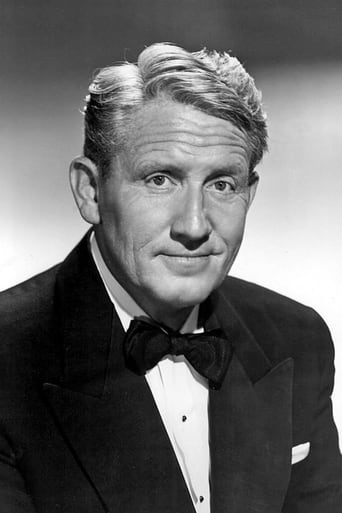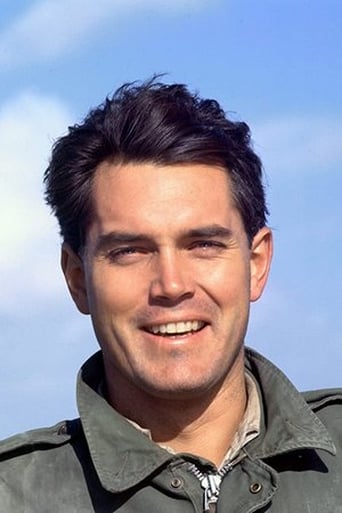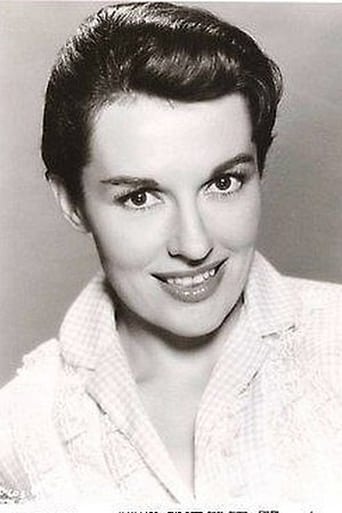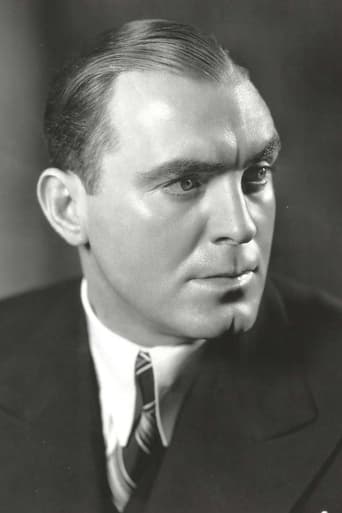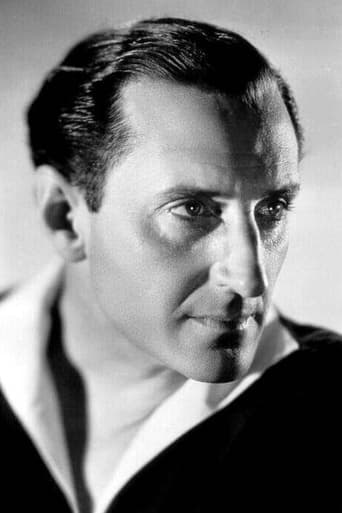Dorathen
Better Late Then Never
TaryBiggBall
It was OK. I don't see why everyone loves it so much. It wasn't very smart or deep or well-directed.
Siflutter
It's easily one of the freshest, sharpest and most enjoyable films of this year.
Juana
what a terribly boring film. I'm sorry but this is absolutely not deserving of best picture and will be forgotten quickly. Entertaining and engaging cinema? No. Nothing performances with flat faces and mistaking silence for subtlety.
mark.waltz
Sometimes, there can be too much of a good thing. In this case, it is the presence of too many characters played by too many veteran stars in cameos, some of them off screen for so long that it is difficult to recognize them. Its a matter of oh, that's funny bald guy Edward Brophy and squeaky voiced Frank McHugh. I didn't realize that they were still alive let alone still working. Jane Darwell still movin' around as a towns-person who attends every funeral. At least modern audiences knew her from her cameo as the bird woman in "Mary Poppins". But what worked in the comedy classic "It's a Mad Mad Mad Mad World" is intrusive here. Tons of characters in a novel can't bring consistent flow to a two hour movie without some confusion no matter how well meaning the script writers was.There is tons of potential for great drama in this political drama of devoted public servant Spencer Tracy running for re-election for mayor even though he's also been governor and suffers from health issues. Tracy is both public hero and a bit of a bully to get what he wants and this has made him both loyal followers and powerful enemies including an aging cardinal and a former Klu Klux Klan member whom Tracy claims had to drop out because he was too cheap to buy his own sheet. Director John Ford utilizes many of his old acting stable including Basil Rathbone, Anna Lee and Ricardo Cortez.What is ironic about this movie is the timing of seeing it again just as scandal rocks American politics all over, particularly New York City as candidates for mayor are raked over the coals in the press. In this movie, Tracy's rival is a buffoon, a real weiner if you pardon the pun. In a sense, this makes a mockery out of politics, but in movies, politicians were often skewered and roasted. By the late 50's, however, the McCarthy scandals had made politics being taken much more seriously and later dramas like Advise and Consent and The Best Man would play on that change. The presence of the amazing Mr. Tracy is certainly worth its prestige, but too many things fall in the way of making this the masterpiece it could have been.
Karl Ericsson
Spencer Tracy is of course superb but that is not what this review is about. Unfortunately, the truth is only hinted at in this movie but it nevertheless shows some of the impossible struggle that goodness has to fight in a capitalist system and probably any other power-system. In comparison, the Swiss system of Direct Democracy is far less manageable by power and far more penetrable for goodness.Capitalism and goodness are simply each others opposites and the result is always a compromise in which goodness always looses the more capitalism is allowed to win. The evil rich man's heaven and the good rich man's way to poverty, that's capitalism. You could also say that it is theft that is coming and theft that is going and theft that stays the same in the hands of Rothschild's, Rockefeller's and the like.This film is about that impossible balance in trying to create something good in what is bad. The film offers no solution to that problem and that is its strength, since there is no solution and only an endless struggle as long as capitalism or any other power-system is allowed to exist.
Gord Jackson (gsjclub55)
In his lifetime, Spencer Tracy received nine Academy Award nominations. Winning twice, in 1937 for "Captain's Courageous" and in 1938 for "Boys Town", he was the first actor to win back-to-back Oscars.In 1958 two films, both based upon best selling novels were released. The first of these was a screen adaptation of Ernest Hemingway's "The Old Man and the Sea", the story of a lone, Cuban fisherman and his solitary fight to 'land the big one.'The second film was a transcription of Edwin O'Connor's look at Irish-American politics in "The Last Hurrah!", Tracy received an Oscar nomination for the former, but should he have been honoured for the latter instead?In "The Old Man and the Sea", Tracy is alone for most of the film's 86 minute running time. A glorious opportunity to show off one's acting chops, having that much screen time to yourself is also a major challenge because it requires the actor to dig deep to maintain our interest since there is no one off of whom he can play. With "The Last Hurrah!", the opposite is true as Tracy is surrounded by a veteran group of scene-stealer's (Basil Rathbone, John Carradine, Edward Brophy, Donald Crisp, Jane Darwell and Anna Lee just to name a few) who challenge him (and us) to keep the focus where it belongs. In each film, loneliness and isolation is a central metaphor. In the Hemingway story, the old, Cuban fisherman, in his rickety, old boat must land 'the big fish' alone and then, alone, fight off 'the sharks' who want to rob him of it. As O'Connor's Mayor Frank Skeffington, he is still alone and isolated, from the modern (and crass) world of his son and political opponents plus he is also unable to give up the old ways that propelled and kept in office even though he knows the days for those old ways are numbered. That he becomes all- too-acutely aware of the accuracy of his perceptions is brilliantly confirmed in one of the cinema's most stunning shots, Skeffington's walk home, alone, after the results of the election are in.For this viewer at least, Hemingway's old man is a skeletal, boring, old man, thus robbing Tracy, gifted actor though he was, of the tools he needed to make him cinematically interesting. O'Connor's Frank Skeffington, on the other hand is much more finally nuanced. A flesh and blood, skin and bone, sinew and tissue firebrand, he is at times almost repulsively sentimental, harsh, kind, churlish, generous, vindictive and opportunistic. In other words, there is real meat here with Tracy, the consummate actor making a feast of it. Was Spencer Tracy nominated for the wrong film in 1958? Yes, I would say he was even though I doubt he would have defeated winner David Niven for his brilliant turn in "Separate Tables".
John T. Ryan
We're not really sure just what it is that quality that the Irish people posses that predisposes them for success at the "Science" and Art of Politics. Scarcely getting their feet wet, the Immigrant from the Emerald Isle when they saw their children out and about working the Precincts for the local Democratic Ward Committeemen. Thus the very people who Good Queen Victoria had told the World were sub-human; short-cut their way to success. The cold realities of the "NINA" Signs* were circumvented all completely with the application of the 'Old Blarney' (Gift of Gab) and a lot of elbow grease.With their numbers in the ranks growing, it wasn't too long a time before that the Alderman (or City Councilman) as well as the real "Power Behind the Throne", the Party Ward Committeeman, were Irish also. The only next logical step is to have the Candidate at the top of the ticket as one of their own.In our own home town of "broad shoulders, Hog Butcher to the World, Stacker of Wheat", …..etc., Chicago, there has been a long standing tradition of a Political Organization or, to put it more bluntly, "The Machine." So, that we have seen a number of different Boss Men in charge in the 20th Century.And this isn't to insinuate that all of the Head Guys were Irish; though the leading exponent of Machine Politics was the Late Richard J. Daley, Mayor of Chicago (1955-1976) and Father of our current Mayor, Richard M. Daley. Over the years we've had City Bosses of various pedigrees and even a Republican, Big Bill Thompson, who ran on a plank of keeping the Saloons open and even promised to punch King George V of Great Britain in the nose. West side Political Powerhouse, Anton J. Cermak, a Czech immigrant, took the reins of the organization during a 2 year short-circuited Mayoral Administration (1931-33). He was struck down by the bullet of assassin Giuseppe Zangara in Miami, Florida, February 15, 1933. This was during an appearance with President-elect Franklin D. Roosevelt. The assumption was that the bullet was meant for Roosevelt, but nobody knows for sure.Others to "ascend the Throne of the Organization/Machine were Edward J. Kelly (1933-47), Martin H. Kennelly (1947-51), Michael A. Bilandic (1976-79), Jane M. Byrne (1979-83), Harold L. Washington (1983-87), Eugene Sawyer (1987-89) and Richard M. Daley (1989-Present). Please forgive my relating all of this similarity to Chicago. Enough of this, already, so ……………… OUR STORY Long time Mayor Frank Skeffington (Spencer Tracy) of an un-named Bostonian-type Big City is facing an election after being in office of one form or another most of his life. Being an old pro, and facing challenge from College Boy-upstart, Kevin McCluskey (Charles B. Fitzsimmons), there is nothing that seems extraordinary about this election. So we are to follow Mr. Skeffington all day long during the last stretch of the election.We see it all through the eyes of Adam Caulfield (Jeffrey Hunter) a newspaper man who is assigned to cover the Campaign of his somewhat estranged Uncle. In addition to the Public Man, we get to see the day to day functions of the Skeffington no one ever sees.In addition to regular duties as the City's Chief Executive, All of us are present when he decides on who a new statue in city park shall be made. The Mayor brings in a host of "mourners" for a socially solitary constituent and gets the widow a rock bottom price by using a little City Hall Arm Twisting on Mortician Johnny Degnan; gently reminding him that his business licensing is up for renewal soon. He also garners support he needs from the City's Bluebloods by "appointing" Amos Force, Jr. (O.Z. Whitehead) the nitwit sissified son of Amos Force (John Carradine) to be the new "Fire Chief", complete with Black Mail Photos.The campaign progresses and the public turns Frank out of office. In making concession speech he announces his new campaign for Governor, which would go unrequited as he is stricken with a highly debilitating stroke. Confined to his bed, all of his political allies and some of the old rivals come by to pay their respects. Frank dies.Director John Ford took an excellent adaptation of the novel and transformed it into great film. Use of the archival-like effect of the Black & White was well executed and effective. Ford & writers Edwin O'Connell (novel) & Frank S. Nugent (screenplay) use ironic twist of having Frank Skeffington, Jr. (Arthur Walsh) characterized as a useless, goodtime, Prodigal Son type; having no interest in his Father's Mayoralty or his declining physical condition.One thing for sure though is that Mr. John Ford put together a super talented cast; some of the regulars, others working with him for the first time. These include: Pat O'Brien, Basil Rathbone, Diane Foster, Donald Crisp, Frank McHugh, James Flavin, James Gleason, Ed Brophy, Basil Ruysdael, Willis Bouchey, Ricardo Cortez, Wallace Ford, Carleton Young, Frank Albertson, Edmund Lowe, William Leslie, Anna Lee, and Ken Curtis. Jane Darwell, Ruth Warren, Helen Westscott, Mimi Doyle, Danny Borzage, William Forrest, Frank Sully, Charles Sullivan and others too numerous to name here.NOTE: * The "NINA" stands for "No Irish Need Apply"signs, which were commonplace in our big cities in the mid to late 19th Century.

